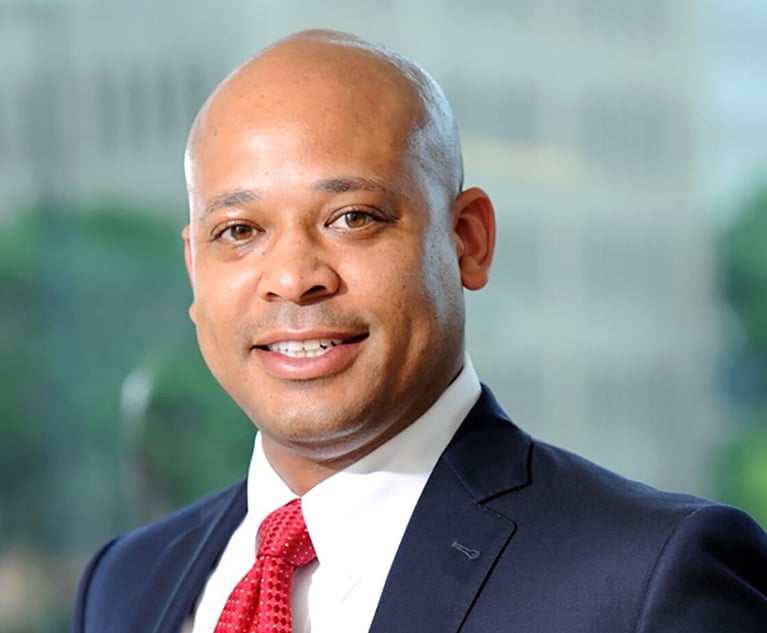Lunchtime Accident Isn't Covered by Workers' Comp, Says Split Appeals Court
The Georgia Court of Appeals held that "an injury occurring during the break period arises out of an individual pursuit and not out of his employment and is not compensable.”
November 27, 2018 at 11:43 AM
7 minute read
 Steven Meyerowitz (Courtesy photo)
Steven Meyerowitz (Courtesy photo)This story is reprinted with permission from FC&S Legal, the industry's only comprehensive digital resource designed for insurance coverage law professionals. Visit the website to subscribe.
A divided Georgia Court of Appeals has rejected application of the ingress and egress rule to the scheduled break exception under the state's workers' compensation act, setting the stage for a possible ruling by the Georgia Supreme Court.
The Case
Every workday, Rochelle Frett, an insurance claims associate for State Farm Insurance Companies, had a mandatory, unpaid 45-minute lunch break. An automated system scheduled staggered lunch breaks to ensure enough associates were available to handle calls.
After logging on for the day, Ms. Frett would see her schedule, including the time for her lunch break. At her scheduled lunch break time, she would log out of the phone system.
Ms. Frett was free to do as she pleased on her break and could leave the office for lunch if she wished. She was not expected or asked to do work during her lunch breaks.
Generally, Ms. Frett brought her lunch and would walk to the State Farm employee breakroom on her floor to prepare her food. During the spring and summer, she would eat her lunch on a bench outside of the office building or in her car in the parking lot. State Farm had a suite in the office building, but did not own the parking lot or the surrounding outdoor areas.
One day, Ms. Frett logged out of the phone system at her assigned time and walked to the breakroom, where she microwaved her food. As she started to exit the breakroom to take her lunch outside the building, she slipped on water and fell. She was still in the breakroom when she fell.
A manager helped Ms. Frett to her feet and instructed her to complete an incident report, which she did. She then took her lunch outside to eat on a bench, as planned, but was in pain and left work early.
Ms. Frett sought workers' compensation benefits for her injuries.
An administrative law judge (“ALJ”) awarded her temporary total disability benefits and medical expenses arising from her fall, relying on the decision in Rockwell v. Lockheed Martin Corp., 545 S.E.2d 121) (Ga. Ct.App. 2001).
The State Board of Workers' Compensation (the “Board”) reversed the ALJ's award, concluding that Ms. Frett's injury had not arisen out of her employment because it had occurred while she was on a “regularly scheduled break.” According to the Board, the fact that Ms. Frett was in the process of leaving and still on State Farm's premises at the time of the injury did not change the outcome as she was leaving to attend to “a purely personal matter.”
The Board distinguished Rockwell on the ground that it addressed whether the workers' compensation act (the “Act”) applied to bar a worker's tort action against her employer, a separate determination from whether an injury was compensable under the Act.
A trial court affirmed the Board's denial of benefits, and Ms. Frett appealed. She asserted that the Board had erred by applying the scheduled lunch break exception to her case and by ruling that the ingress and egress rule did not apply to an employee leaving the employer's premises on a scheduled lunch break.
The Appellate Court's Decision
The appellate court affirmed.
In its decision, the appellate court explained that Georgia law provided for a “scheduled break exception” to compensability under the Act. Under this exception, the appellate court observed, “where a scheduled rest break or lunch break is provided to employees during which the employee is free to use the time as he chooses, making it personal to him, an injury occurring during the break period arises out of an individual pursuit and not out of his employment and is not compensable.”
The appellate court then pointed out that a separate line of cases created the “ingress and egress rule,” recognizing “that the period of employment generally includes a reasonable time for ingress to and egress from the place of work, while on the employer's premises.” It added that, in Rockwell, it applied the ingress and egress rule for the first time to an employee leaving for a scheduled lunch break. The employee fell while traveling across a walkway on her way to a parking lot. Believing that her injury was not compensable under the Act, the employee brought a tort suit against her employer, and the appellate court held that the Act applied as the exclusive remedy, barring her tort suit, and that the employee could pursue a workers' compensation claim on the basis of the “ingress and egress” rule:
Generally, where an employee is on a scheduled break and is not conducting her employer's business, the Workers' Compensation Act does not apply. But the “ingress and egress” rule is equally clear: Where the employee is still on her employer's premises in the act of egressing those premises, even if on break, then the Workers' Compensation Act does apply. Therefore, [the employer] may not deny [the employee] benefits based on the inapplicable “scheduled break” exception.
The appellate court in Ms. Frett's case recognized that the intersection of the ingress and egress rule with the scheduled break rule created “anomalous and arbitrary results” in that an employee choosing to leave his or her employer's premises during a scheduled lunch break who was injured while departing or returning would be compensated under the Act, but an employee who remained on the employer's premises and was injured during a scheduled lunch break would have no such coverage. Moreover, the appellate court continued, whether an employee had the subjective intent to depart the premises would determine coverage when an employee was injured on the employer's premises at the beginning of a scheduled break.
The appellate court then declared that “[t]hese two lines of cases should not be allowed to continue to co-exist,” and it rejected application of the ingress and egress rule to the scheduled break exception. Any such application, the appellate court stated, should be made by the Georgia Supreme Court, which has never expressed its view on the ingress and egress rule generally.
The appellate court then found that Ms. Frett's injury did not arise out of her employment, but rather out of an “individual pursuit,” because her lunch breaks were scheduled and she was free to do as she pleased during that time. Accordingly, it concluded, given this “clearer bright-line rule,” the trial court had not erred in affirming the Board's denial of benefits based on the scheduled break exception.
The case is Frett v. State Farm Employee Workers' Compensation, No. A18A0820 (Ga. Ct.App. Nov. 2, 2018).
FC&S Legal Comment
The appellate court's decision may not be the last word on the matter.
One judge wrote a dissent, in which the two judges concurred and in which another judge concurred in the judgment only in the dissent, recognizing that the relationship between the ingress and egress rule and the scheduled break rule had become “unnecessarily clouded” but concluding that the ALJ had properly applied Rockwell to find Ms. Frett's injuries compensable.
The Supreme Court of Georgia has not revisited the scheduled break rule following the creation of the ingress and egress rule. Perhaps it soon will do so.
Steven A. Meyerowitz is the director of FC&S Legal, editor-in-chief of the Insurance Coverage Law Report and founder and president of Meyerowitz Communications Inc.
This content has been archived. It is available through our partners, LexisNexis® and Bloomberg Law.
To view this content, please continue to their sites.
Not a Lexis Subscriber?
Subscribe Now
Not a Bloomberg Law Subscriber?
Subscribe Now
NOT FOR REPRINT
© 2024 ALM Global, LLC, All Rights Reserved. Request academic re-use from www.copyright.com. All other uses, submit a request to [email protected]. For more information visit Asset & Logo Licensing.
You Might Like
View All
Business Breakups: Why Business and Commercial Cases Are Well-Suited to Mediation
5 minute read

In RE: Hair Relaxer Marketing, Sales Practices and Products Liability Litigation
Trending Stories
- 1PepsiCo's Legal Team Champions Diversity, Wellness, and Mentorship to Shape a Thriving Corporate Culture
- 2The Dynamic Duo Behind CMG's Legal Ops Team
- 3Land Use Issues Presented By Cold Storage Warehouses
- 4Zero-Dollar Verdict: Which of Florida's Largest Firms Lost?
- 5Appellate Div. Follows Fed Reasoning on Recusal for Legislator-Turned-Judge
Who Got The Work
Michael G. Bongiorno, Andrew Scott Dulberg and Elizabeth E. Driscoll from Wilmer Cutler Pickering Hale and Dorr have stepped in to represent Symbotic Inc., an A.I.-enabled technology platform that focuses on increasing supply chain efficiency, and other defendants in a pending shareholder derivative lawsuit. The case, filed Oct. 2 in Massachusetts District Court by the Brown Law Firm on behalf of Stephen Austen, accuses certain officers and directors of misleading investors in regard to Symbotic's potential for margin growth by failing to disclose that the company was not equipped to timely deploy its systems or manage expenses through project delays. The case, assigned to U.S. District Judge Nathaniel M. Gorton, is 1:24-cv-12522, Austen v. Cohen et al.
Who Got The Work
Edmund Polubinski and Marie Killmond of Davis Polk & Wardwell have entered appearances for data platform software development company MongoDB and other defendants in a pending shareholder derivative lawsuit. The action, filed Oct. 7 in New York Southern District Court by the Brown Law Firm, accuses the company's directors and/or officers of falsely expressing confidence in the company’s restructuring of its sales incentive plan and downplaying the severity of decreases in its upfront commitments. The case is 1:24-cv-07594, Roy v. Ittycheria et al.
Who Got The Work
Amy O. Bruchs and Kurt F. Ellison of Michael Best & Friedrich have entered appearances for Epic Systems Corp. in a pending employment discrimination lawsuit. The suit was filed Sept. 7 in Wisconsin Western District Court by Levine Eisberner LLC and Siri & Glimstad on behalf of a project manager who claims that he was wrongfully terminated after applying for a religious exemption to the defendant's COVID-19 vaccine mandate. The case, assigned to U.S. Magistrate Judge Anita Marie Boor, is 3:24-cv-00630, Secker, Nathan v. Epic Systems Corporation.
Who Got The Work
David X. Sullivan, Thomas J. Finn and Gregory A. Hall from McCarter & English have entered appearances for Sunrun Installation Services in a pending civil rights lawsuit. The complaint was filed Sept. 4 in Connecticut District Court by attorney Robert M. Berke on behalf of former employee George Edward Steins, who was arrested and charged with employing an unregistered home improvement salesperson. The complaint alleges that had Sunrun informed the Connecticut Department of Consumer Protection that the plaintiff's employment had ended in 2017 and that he no longer held Sunrun's home improvement contractor license, he would not have been hit with charges, which were dismissed in May 2024. The case, assigned to U.S. District Judge Jeffrey A. Meyer, is 3:24-cv-01423, Steins v. Sunrun, Inc. et al.
Who Got The Work
Greenberg Traurig shareholder Joshua L. Raskin has entered an appearance for boohoo.com UK Ltd. in a pending patent infringement lawsuit. The suit, filed Sept. 3 in Texas Eastern District Court by Rozier Hardt McDonough on behalf of Alto Dynamics, asserts five patents related to an online shopping platform. The case, assigned to U.S. District Judge Rodney Gilstrap, is 2:24-cv-00719, Alto Dynamics, LLC v. boohoo.com UK Limited.
Featured Firms
Law Offices of Gary Martin Hays & Associates, P.C.
(470) 294-1674
Law Offices of Mark E. Salomone
(857) 444-6468
Smith & Hassler
(713) 739-1250







